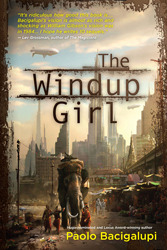Time, Quality, & The Modern SFF Novel
Yesterday, I referred readers to a number of interesting (I thought!) articles I'd read otherwhere in internet land. One of them was a two-part interview with Paolo Bacigalupi on the Orbit blog. One of the things that stuck with me in what he said, when speaking about his award-winning novel, The Windup Girl, was this:
 "In the end, it took me about three years to write, not including the couple of years before where I'd been working out the world and writing short stories set there."
"In the end, it took me about three years to write, not including the couple of years before where I'd been working out the world and writing short stories set there."
You all know that I think The Windup Girl is an outstanding novel. And clearly a few other folk think so, too, because the awards its won include 2010 Hugo, Locus and Compton Crook Awards and the Nebula Award 2009, as well as being named as the ninth best fiction book of 2009 by TIME magazine. Awards aren't everything, of course, but still—not bad going, huh?
But here's the thing: what Bacigalupi said in the Orbit interview is that The Windup Girl took him between 3 – 5 years to write. Now there is no way that I can prove a correlation between time spent and quality, but there's no doubt in my mind that The Windup Girl is a quality book. Equally clearly, it also took time to produce …
This has got me thinking, especially about today's SFF writing world and the pressure to crank out a completed manuscript in 6 months to a year maximum. And although, once again, I cannot prove a correlation between timeframe and quality, I cannot help noticing several contemporary series where I have loved the first book and been bitterly disappointed with the second and third. I cannot help but wonder how much of this is because the first books are not written to such a tight timeframe, but the subsequent books are—and there just hasn't been enough time to really get them right?
Effectively, what the 6-12 month standard timeframe means is that books are being treated like a production line item. But are they, really? After all, no matter how much the writer may strive to write to a formula, each plot is still at least slightly different, with some fresh problem to be resolved, and usually has to bring in some new characters as well. That's just at the formula end of the spectrum. If an author does not wish to write formula, but rather seeks to try and create something really new with each book, then the going gets even tougher …
I think there is no question that time-to-market matters in our modern world. But what is the flip side of getting products to market quickly if in the end they disappoint readers? And if readers learn that the subsequent books in a series may often disappoint, what does that mean for the market in the medium to longer term? The whole thing about production line development after all, is the ability to replicate uniform design and achieve uniform quality—so if you can't assure those two aspects through your process, then you're not going to have a successful operation. So I think my conclusion is that books aren't an industrial product and don't suit that sort of model. And if they are an artisan product, where each item has some degree of uniqueness about it, then uniform time/production processes just aren't going to work, certainly not all of the time—and are probably going to miss the quality/customer satisfaction target a lot of the time.
All food for thought, both as a reader and writer, even if I have no answers but only speculation to share—but from observation and experience, I cannot help feeling that it is no accident that an outstanding novel like The Windup Girl also took time in the making.



